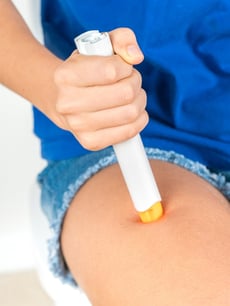 When you or a loved one has a severe allergic reaction it can be frightening. Some allergic reactions are merely uncomfortable or inconvenient, while others can be life threatening. This type of reaction is called anaphylaxis and can cause the body to go into shock. Blood pressure drops and swelling occurs, creating difficulty breathing. In some cases this reaction can occur in a matter of a minute or two from the time of exposure to the allergen. So what can you do to help someone going into anaphylaxis?
When you or a loved one has a severe allergic reaction it can be frightening. Some allergic reactions are merely uncomfortable or inconvenient, while others can be life threatening. This type of reaction is called anaphylaxis and can cause the body to go into shock. Blood pressure drops and swelling occurs, creating difficulty breathing. In some cases this reaction can occur in a matter of a minute or two from the time of exposure to the allergen. So what can you do to help someone going into anaphylaxis?
Know the Signs of Anaphylactic Shock
The early stages of anaphylaxis can be different for everyone. Some reactions will come on quickly while others take a little more time to develop. Some common signs to look for include:
- Hives or skin reactions
- Skin looking flushed or pale
- Cold or clammy skin
- Swelling of the face or throat
- Trouble breathing, wheezing
- Pulse is weak and rapid
- Dizziness or fainting
- Nausea or vomiting
Common Causes of Anaphylaxis
The range of triggers for allergic reaction is very broad. Your doctor can help diagnose allergies by assessing previous reactions and doing blood and skin tests.
A few common causes of severe allergic reaction are:
- Adverse reaction to medication
- Bee and wasp stings
- Foods allergies: peanuts, shellfish, etc.
Epinephrine Autoinjector (EpiPen)
Anyone who has the potential for a severe and potentially life-threatening allergic reaction should carry an epinephrine autoinjector, commonly called an EpiPen. You can have your doctor prescribe one for you and it's best to get multiple. There is an expiration date on them, so check it to make sure it's still going to be effective.
The EpiPen is a syringe with a concealed spring loaded needle that injects a single dose of medication when you press it against your thigh.
If you are trying to help someone having an anaphylactic reaction and they have an epinephrine autoinjector, follow these steps:
- Call 911 to get professional medical help on their way
- Ask if they need your help to inject the medication, some may prefer to do it themselves
- If they require your help, press the autoinjector firmly against the person's thigh. Don't hold back, it should be a quick, firm stick to get the needle deep enough into the tissue
- Have the person lay down and elevate their legs
- Check their pulse and monitor breathing
- Administer CPR if necessary
- If there are no signs of breathing, coughing or movement, start administering CPR immediately - use about 100 chest compressions per minute.
Get Professional Medical Help
The single most important thing you can do in this situation is to call 911 or get them to the nearest hospital. The sooner that professional medical staff can assess the situation, the higher the likelihood of survival. Even if symptoms appear to be improving you still need to get that person to a doctor. Symptoms can slow and then recur so don't assume it's safe. The hospital will likely keep them for several hours of monitoring even after symtopms have subsided.
Below are some common medical treatments that hospital staff will administer:
- Epinephrine (also known as adrenaline) to relieve the body's anaphylactic response
- Oxygen to make sure your body is getting enough oxygen into the blood while airways are restricted
- Antihistamines and/or cortisone to reduce your body's inflammatory response and open up airways
Orchard Hospital Can Help
Orchard Hospital has the experienced staff to help in situations of anaphylactic shock. If you are concerned that you or a loved one might be at risk of severe allergic reactions, please contact us to schedule an appointment, or visit us at our walk-in clinic, the Medical Specialty Center—Your Everyday Health Care Clinic. We can identify potential allergens and prescribe an epinephrine autoinjector if there is risk of an anaphylactic response. We encourage you to be prepared, see your doctor regularly and take a proactive role in your healthcare.



